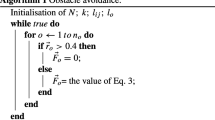Abstract
Flocking models allow high level organization in huge groups of agents. We deal with a multitarget extension of flocking. In this extension, each agent chooses a target to follow, and several flocks are formed then. In comparison with previous multitarget flocking algorithms, our proposal can handle several obstacles in the environment and it is based on the Particle Swarm Optimization Algorithm. Simulations have shown that the desired behavior of the system was achieved. Our future work considers the extension of the model for 3D environments.
Access this chapter
Tax calculation will be finalised at checkout
Purchases are for personal use only
Preview
Unable to display preview. Download preview PDF.
Similar content being viewed by others
References
Reynolds, C.: Flocks, herds and schools: A distributed behaviour model. Computer Graphics 21, 25–34 (1987)
Olfati-Saber, R.: Flocking for multi-agent dynamic systems: Algorithms and theory. IEEE Transactions on Automatic Control, 51(3), 401–420 (2006)
Luo, X., Li, S., Guan, X.: Flocking algorithm with multi-target tracking for multi-agent systems. Pattern Recognition Letters 31(9), 800–805 (2010)
Kim, D., Shin, S.: Self-organization of decentralized swarm agent based on modified particled swarm algorithm. Journal of Intelligent and Robotic Systems 46, 129–149 (2006)
Serrato Barrera, A., López-López, A., Rodríguez Gómez, G.: Multitarget flocking for constrained environments. In: Demazeau, Y., et al. (eds.) Advances on PAAMS. AISC, vol. 155, pp. 181–190. Springer, Heidelberg (2012)
Author information
Authors and Affiliations
Corresponding author
Editor information
Editors and Affiliations
Rights and permissions
Copyright information
© 2012 Springer-Verlag Berlin Heidelberg
About this paper
Cite this paper
Barrera, A.S., López-López, A., Gómez, G.R. (2012). Demonstration of Multitarget Flocking for Constrained Environments. In: Demazeau, Y., Müller, J., Rodríguez, J., Pérez, J. (eds) Advances on Practical Applications of Agents and Multi-Agent Systems. Advances in Intelligent and Soft Computing, vol 155. Springer, Berlin, Heidelberg. https://doi.org/10.1007/978-3-642-28786-2_39
Download citation
DOI: https://doi.org/10.1007/978-3-642-28786-2_39
Publisher Name: Springer, Berlin, Heidelberg
Print ISBN: 978-3-642-28785-5
Online ISBN: 978-3-642-28786-2
eBook Packages: EngineeringEngineering (R0)




